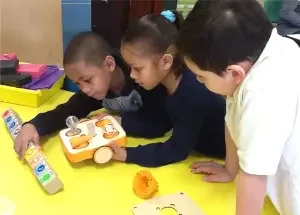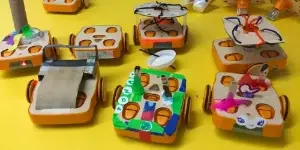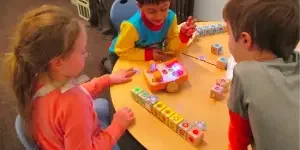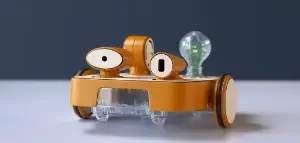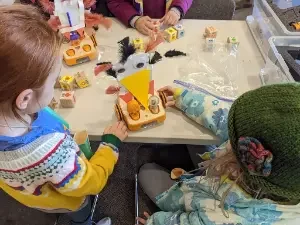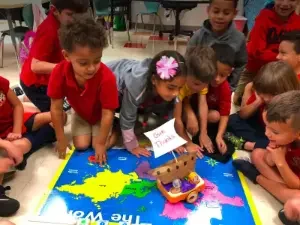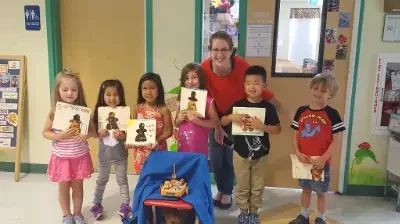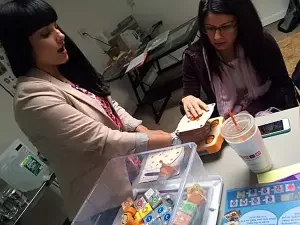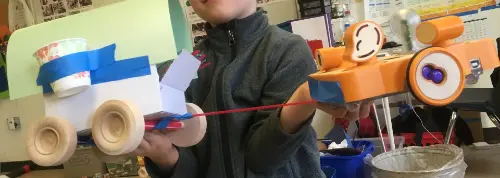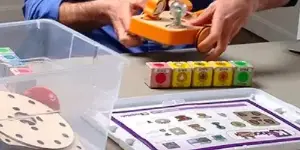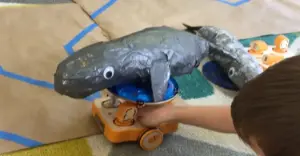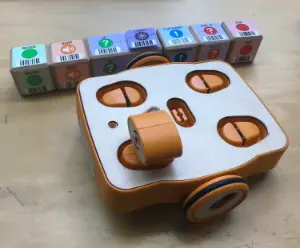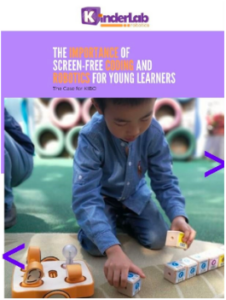KinderLab Robotics Offers Two Free KIBO Activities for the Worldwide Hour of Code Event
Launching during Computer Science Education Week, the one-hour robotics and coding lessons aim to help young students express their creativity through computer science
(Waltham, MA) December 4, 2018 — KinderLab Robotics, the creators of the KIBO™ robot kit, today announced their participation in the worldwide Hour of Code event. Hour of Code™ is an initiative by Computer Science Education Week and Code.org to introduce millions of students to computer programming through focused, easy-to-implement one-hour activities. KinderLab has joined hundreds of partners to support this movement by submitting two activities to the Hour of Code 2018 event taking place from December 3rd—9th.
The overall theme for the 2018 Hour of Code event is to “promote and celebrate computer science as a medium for creativity and creation,” which falls directly in line with the design principles behind KIBO. KIBO provides a screen-free platform for introducing coding in early childhood education. Coding is a critical foundational skill for literacy of the 21st century, and learning coding gives children new tools for creative self-expression.
“When we teach children how to read and write, we don’t expect everyone to become a journalist or a novelist,” said KinderLab Robotics’ co-founder and chief scientist, Dr. Marina Bers. “But we believe they’ll be able to think in new ways because literacy opens the doors to thinking. We believe the same thing for the skills of programming and engineering.”
KinderLab celebrates this week, as their mission is to provide research-based robot kits to every young child. By introducing robotics in early learning, KIBO presents STEAM concepts in a playful way and gets even the youngest learners excited about science, technology, engineering, arts, and math. With the research-based KIBO robot kit, young children ages 4—7 can become programmers, engineers, designers, artists, dancers, choreographers, and writers.
KinderLab Robotics’ two Hour of Code activities are:
- Teach Your KIBO Robot to Dance: In this activity, students pick a favorite classroom song, or a song connected to a world culture they’re exploring. They then decorate their KIBO as the dancer and create a program to teach their KIBO to dance to the music. They learn how to create a program to express the dance, with a focus on sequencing ability.
- Measure and Predict with KIBO Robot Bowling: This activity lets students play with KIBO as a bowling ball that they program to move down the bowling lane toward the pins. Students can create a single straight lane or a more complicated path, while using estimation and measurement to create a program that guides their robot down the length of the lane. They can test how far a single forward block carries KIBO, then improve their program using the Engineering Design Process.
In addition to providing activities for the Hour of Code, KinderLab will mark the end of Computer Science Education Week at the Museum of Science in Boston on December 8th. KIBO will be on hand at the Museum to introduce young visitors to robotics and coding through fun and educational hands-on activities, including the KIBO Bowling and KIBO Dance activities.
About KinderLab Robotics, Inc.
KinderLab Robotics is the creator of KIBO, a playful, educational robot kit based on 20 years of child development research with children, teachers, and parents. Developed specifically for teachers by Dr. Marina Umaschi Bers at Tufts University, KIBO is used in 54 countries and has proven efficacy in helping kids learn STEAM—and get excited about it! KinderLab offers a complete suite of teaching materials that help integrate STEAM elements into a wide range of curricula, including art, cultural studies, and reading literacy. With KIBO, children ages 4–7 can create, design, decorate, and bring their own robot to life—all without requiring screen time. Young learners create a coding sequence using the wooden programming blocks, scan their sequence with the barcode scanner built into the robot body, press KIBO’s button, and watch their creation go!
When children build, code, and decorate their own robot, they perceive it as play, but they are learning invaluable STEAM skills. Not only are these hands-on experiences inherently rewarding, but they help children understand the technology in their world and can even improve their future job prospects.
KIBO is a Winner in the Technology/Preschool category in the 2018 Seriously STEM awards as well as numerous other awards. For more information, please visit KinderLabRobotics.com.
Press Contact
Chris Piehler
PR with Panache!
chris@prwithpanache.com

